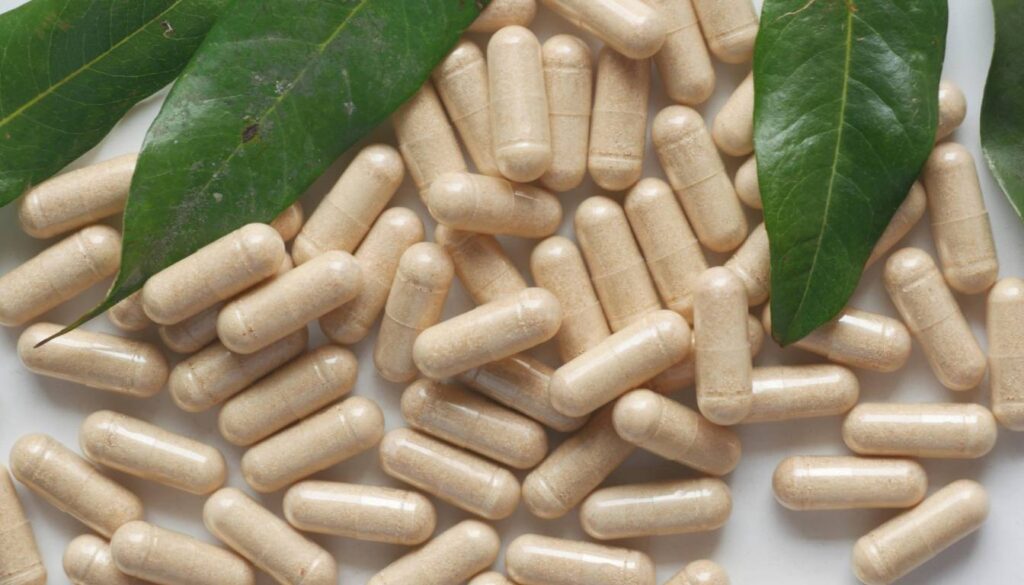Can herbal supplements be dangerous? For centuries, people have turned to herbal supplements to support health and wellness. While many assume that natural remedies are always safe, that isn’t necessarily the case. Some have been scientifically shown to be both effective and safe, while others may pose serious. Even life-threatening, risks. Let’s take a closer look!
As a nutritionist, I have seen many patients who have experienced adverse effects from taking herbal supplements. Some of these supplements can interact with prescription medications, making them less effective or causing dangerous side effects. Others can cause allergic reactions or even organ damage. It is important to understand that just because a supplement is natural does not mean it is safe for everyone to take.
When considering taking a dietary supplement, it is important to do your research and talk to a healthcare provider. Look for supplements that have been tested for safety and efficacy, and avoid products that make exaggerated or false claims. Remember that while herbal supplements can be a helpful addition to a healthy lifestyle, they should never be used as a replacement for medical treatment.
Understanding Herbal Supplements
Definition
Herbal supplements are products made from plants that are used to supplement a person’s diet. These supplements can come in various forms, including teas, oils, capsules, and tablets. They are often marketed as natural alternatives to traditional medications and are commonly used in alternative medicine practices.
Types of Supplements
There are many different types of herbal supplements, each with its own set of benefits and potential risks. Some of the most common types of herbal supplements include:
- Herbs: These are plants that are used for their medicinal properties. Some popular herbs used in supplements include echinacea, ginkgo biloba, and St. John’s wort.
- Vitamins and minerals: These are nutrients that are essential for good health. Herbal supplements containing vitamins and minerals may be used to address specific deficiencies in a person’s diet.
- Dietary supplements: These are supplements that are used to supplement a person’s diet. They may contain a variety of different ingredients, including herbs, vitamins, and minerals.
When taking herbal supplements, it is important to be aware of potential risks. While many herbal supplements are safe when taken as directed, some can interact with medications or cause side effects. It is important to talk to a healthcare provider before taking any herbal supplements, especially if you are taking medications or have a pre-existing medical condition.
Potential Risks and Side Effects
Herbal supplements are often considered safe, but they can pose risks and side effects, especially when taken in large doses or combination with other medications. Here are some potential risks and side effects associated with herbal supplements:
Liver and Kidney Damage
Some herbs, such as kava and comfrey, have been linked to liver damage. According to a WebMD article, “Kava has been reported to cause liver damage, including hepatitis and liver failure.” In addition, comfrey has been linked to liver damage and cancer. It is important to talk to your doctor before taking any herbal supplements, especially if you have a history of liver or kidney disease.
Drug Interactions
Herbal supplements can interact with prescription medications and cause adverse reactions. For example, ginseng can interact with warfarin, aspirin, and digoxin, increasing the risk of bleeding and lowering blood pressure. It is important to inform your doctor about any herbal supplements you are taking, as well as any prescription medications.
Delay or Replacement of Conventional Treatment
Some people may turn to herbal supplements as a replacement for conventional treatment, which can be dangerous. According to a Harvard Health Publishing article, “Dietary supplements may lead to dangerous effects. A new study linked weight loss, muscle building and energy boosting supplements with a higher risk for serious adverse events when compared to vitamins.” It is important to talk to your doctor before taking any herbal supplements, especially if you have a medical condition or are taking prescription medications.
While herbal supplements may seem like a natural and safe alternative to prescription medications, they can pose risks and side effects. It is important to talk to your doctor before taking any herbal supplements, especially if you have a medical condition or are taking prescription medications.
How to Ensure Safety When Taking Herbal Supplements
When taking herbal supplements, it is important to ensure safety by following some basic guidelines. Here are some tips to help ensure the safety of your herbal supplement use:
Consult with a Healthcare Professional
Before taking any herbal supplements, it is important to consult with a healthcare professional, such as a doctor or pharmacist. They can provide guidance on whether the supplement is safe for you to take and can help you avoid potential interactions with other medications or health conditions you may have. Integrative medicine practitioners can also provide guidance on the safe use of herbal supplements.
Choose Reputable Brands
It is important to choose reputable brands when purchasing herbal supplements. This can help ensure that the supplement contains the active ingredients listed on the label and that it has been manufactured and tested to meet quality standards. The FDA regulates dietary supplements, but it is important to note that not all supplements on the market are safe or effective. Check for any warning letters or recalls issued by the FDA before purchasing any supplement.
Read Labels and Instructions Carefully
Read the labels and instructions carefully before taking any herbal supplement. Look for information on the active ingredients, dosage recommendations, and potential side effects. Be aware that some supplements may be adulterated with unlisted ingredients, which can be harmful. If you experience any side effects while taking a supplement, stop taking it and contact your healthcare provider.
By following these guidelines, you can help ensure the safety of your herbal supplement use. It is also important to monitor your health and report any adverse effects to your healthcare provider.
Before You Go – Can Herbal Supplements Be Dangerous?

It’s important to be informed and cautious when it comes to herbal supplements. While these supplements can provide benefits, they can also pose risks to our health if not used properly. As a consumer, it is our responsibility to educate ourselves on the potential risks and benefits of any herbal supplement we consider taking.
Importance of Being Informed and Cautious
One of the most important things we can do to protect ourselves is to be informed. This means researching the safety, efficacy, and potential interactions of any herbal supplement we are considering. We should also be cautious when using these supplements, starting with small doses and monitoring our bodies for any adverse reactions.
The Food and Drug Administration (FDA) does not regulate herbal supplements in the same way it regulates drugs. This means that manufacturers are not required to prove the safety or effectiveness of their products before they are sold. As a result, it is important to seek out reputable brands and to be wary of any supplement that makes exaggerated or false claims.
Resources for More Information and Guidance
There are many resources available to help us make informed decisions about herbal supplements. The National Center for Complementary and Integrative Health (NCCIH) provides information on traditional Chinese medicine and other complementary health practices. The FDA also provides guidance on the safety and regulation of dietary supplements.
Studies and research on the safety and efficacy of herbal supplements are ongoing. It is important to stay up to date on the latest findings and to consult with a healthcare professional before taking any new supplement.
In summary, while herbal supplements can provide benefits, they can also pose risks to our health if not used properly. As consumers, it is our responsibility to educate ourselves, be cautious, and seek out reputable resources for guidance.
Can Herbal Supplements Be Dangerous? The Herb Prof Weighs In
Hello, herb enthusiasts! Today, we’re tackling a thorny question: Can Herbal Supplements Be Dangerous? It’s like navigating a garden full of roses – beautiful, but with potential for pricks!
Herbal supplements, like all things, can have side effects. They’re the most fun friend, but has their moments!
These supplements can interact with medications or have unwanted effects in large doses. It’s like having a friend who doesn’t always get along with everyone!
So, there you have it! The potential dangers of herbal supplements, and how we can navigate them safely. For more herbal wisdom, don’t forget to visit my homepage at theherbprof.com. You can check our homepage here!
References – Can Herbal Supplements Be Dangerous?
Little Herb Encyclopedia, by Jack Ritchason; N.D., Woodland Publishing Incorporated, 1995
The Ultimate Healing System, Course Manual, Copyright 1985, Don Lepore
Planetary Herbology, Michael Tierra, C.A., N.D., Lotus Press, 1988
Handbook of Medicinal Herbs, by James A. Duke, Pub. CRP Second Edition 2007
The Complete Medicinal Herbal, by Penelope Ody, Published by Dorling Kindersley
Check the Following Articles!
Herbs Tavern Reviews: A Guide to the To Dishes
Honeybee Herb Banger Review: A Comprehensive Analysis
Are Herbal Remedies Effective? A Look at the Evidence
Frequently Asked Questions – Can Herbal Supplements Be Dangerous?
1. What are the potential risks associated with taking herbal supplements?
Herbal supplements are not regulated by the FDA, which means that there is no guarantee of their safety or efficacy. Some supplements may contain harmful substances, contaminants, or adulterants that can cause serious health problems. Additionally, certain herbs can interact with prescription medications, leading to adverse reactions. It is important to talk to a healthcare provider before taking any herbal supplement.
2. Can certain combinations of herbal supplements cause adverse reactions?
Yes, certain combinations of herbal supplements can cause adverse reactions. For example, taking St. John’s wort with antidepressants can cause a potentially life-threatening condition called serotonin syndrome. Similarly, taking echinacea with immunosuppressants can reduce the effectiveness of the medication. It is important to talk to a healthcare provider before combining any herbal supplements.
3. What symptoms might indicate an overdose of herbal supplements?
Symptoms of an overdose of herbal supplements can vary depending on the supplement and the amount taken. Some common symptoms include nausea, vomiting, diarrhea, dizziness, headache, and liver damage. In severe cases, an overdose can lead to coma or death. It is important to follow the recommended dosage on the supplement label and talk to a healthcare provider if you experience any concerning symptoms.
4. How can herbal supplements impact liver health?
Some herbal supplements can cause liver damage or liver failure. For example, kava kava has been linked to liver toxicity, and green tea extract can cause acute liver injury. It is important to talk to a healthcare provider before taking any herbal supplement, especially if you have a history of liver disease.
5. What are some known interactions between herbal supplements and medications?
There are many known interactions between herbal supplements and medications. For example, ginkgo biloba can increase the risk of bleeding when taken with blood-thinning medications, and garlic can interact with HIV medications and birth control pills. It is important to talk to a healthcare provider before taking any herbal supplement, especially if you are taking prescription medications.
6. What are the limitations or disadvantages of using herbal medicine?
One of the main limitations of using herbal medicine is the lack of regulation and standardization. Unlike prescription medications, herbal supplements are not required to undergo clinical trials or prove their safety and efficacy. Additionally, there is often limited scientific evidence to support the use of herbal supplements for specific health conditions. It is important to talk to a healthcare provider before using any herbal supplement and to use them as part of a holistic approach to health and wellness.
